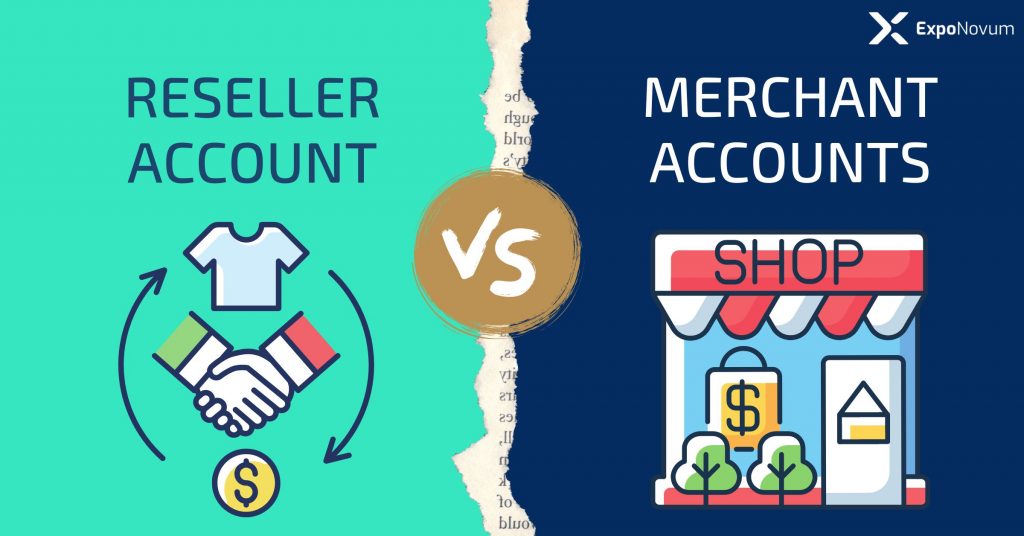Reseller and Merchant Accounts
A reseller account is a type of payment processing arrangement in which a company acts as a middleman, facilitating transactions between merchants and banks. A merchant account, on the other hand, is a direct agreement between a merchant and a bank that allows the merchant to process and accept credit and debit card payments.
The purpose of this article is to compare and contrast the two types of payment processing arrangements, reseller vs merchant accounts, and to provide information to help business owners make an informed decision about which option is best for their particular needs.
We will define both reseller and merchant accounts and explain the purpose of the article. This will provide the reader with a clear understanding of what will be covered in the following chapters and what they can expect to learn from the article as a whole.
Reseller Accounts
A reseller account is a payment processing arrangement in which a third-party company acts as a mediator, enabling transactions between merchants and banks. This type of arrangement allows merchants to accept credit and debit card payments without having to establish a direct relationship with a bank. Instead, the reseller company acts as the intermediary, handling the financial transactions and providing the necessary technology and support.

Advantages of a Reseller Account
There are several advantages to using a reseller account for payment processing, including:
Cost Savings
Reseller accounts are often less expensive than merchant accounts, making them a more cost-effective option for small and medium-sized businesses.
Flexibility
Reseller accounts are highly flexible and can be adapted to meet the specific needs of different types of businesses.
Ease of Set-Up
Reseller accounts are generally easier to set up than merchant accounts, which can be a time-consuming and complex process.
Additional revenue stream
As a reseller, you can sell products and services to your own clients, which can generate additional revenue for your business.
Branding and customization
Reseller accounts often provide the ability to brand and customize the products and services you offer, giving you greater control over the customer experience and the ability to differentiate yourself from competitors.
Technical support
Many reseller accounts come with technical support, which can be a valuable resource for you and your clients when you need assistance with product installation, configuration, or troubleshooting.
Scalability
Reseller accounts can be a great option for businesses that want to start small and gradually scale their operations as they grow. With a reseller account, you can typically start with a small investment and increase your services and customer base over time.
Access to a wide range of products and services
Reseller accounts often provide access to a wide range of products and services from multiple providers, which can help you meet the needs of a diverse customer base.
Control over pricing
As a reseller, you have control over the pricing of the products and services you offer, allowing you to set your own margins and differentiate yourself from competitors.
Disadvantages of a Reseller Account
While there are several advantages to using a reseller account, there are also some disadvantages that should be considered, including:
Limited Control
When you use a reseller account, you’re typically dependent on the provider for product and service updates, technical support, and other key functions. This can limit your control over the customer experience and the quality of the products and services you offer.
Dependence on a Third Party
Merchants who use a reseller account are relying on the reseller company to handle their payment processing, which can lead to dependence on a third party and potential difficulties in the event of a dispute.
Lack of Customization
Reseller accounts may not be as customizable as merchant accounts, which can limit the ability of businesses to adapt their payment processing to meet their specific needs.
Lack of differentiation
Depending on the reseller account you choose, you may have limited options for customizing the products and services you offer. This can make it difficult to differentiate yourself from competitors and build a strong brand identity.
Pricing constraints
While reseller accounts can offer discounted pricing, you may also be limited in your ability to set your own prices and margins. This can make it difficult to compete with other resellers and providers in the market.
Technical limitations
Some reseller accounts may have limitations on the technical capabilities of the products and services you offer. This can be especially problematic if you have clients with specific technical requirements that can’t be met with the products and services available through your reseller account.
Limited product range
While some reseller accounts offer access to a wide range of products and services, others may have a more limited product range. This can limit your ability to meet the needs of a diverse customer base and may make it difficult to expand your business over time.
Contractual obligations
Depending on the provider, reseller accounts may come with contractual obligations that can be difficult to meet or may limit your ability to operate your business in certain ways. Be sure to carefully review the terms of any reseller account agreement before signing up.
Reputation risk
If the provider of your reseller account has a poor reputation, it can reflect negatively on your business and damage your own reputation with clients. Be sure to carefully research any reseller account providers before signing up, and consider the potential risks to your brand and reputation.
Merchant Accounts
A merchant account is a direct relationship between a merchant and a bank that enables the merchant to accept and process credit and debit card payments. This type of payment processing relationship provides merchants with direct control over their payment processing operations and the ability to customize their setup to meet their specific needs.

Advantages of a Merchant Account
A merchant account can offer several advantages for businesses that need to process payments from customers. Some of the key advantages of a merchant account include:
Full Control
With a merchant account, merchants have full control over their payment processing operations, allowing them to manage their finances and operations in a way that best suits their needs.
Customization
Merchant accounts offer greater customization options than reseller accounts, allowing businesses to adapt their payment processing to meet their specific requirements.
Improved Security
Merchant accounts typically use encryption and other security measures to protect sensitive customer information, reducing the risk of fraud and other security breaches. This can help businesses build trust with customers and protect their own reputation.
Increased payment options
With a merchant account, businesses can typically accept a wider range of payment options, including credit and debit cards, online payments, and mobile payments. This can make it easier for customers to make purchases and can help businesses reach a wider audience.
Improved cash flow
Merchant accounts typically process payments more quickly than traditional check or cash payments. This can help businesses improve their cash flow and reduce the risk of bounced checks or other payment issues.
Improved customer experience
By offering a wider range of payment options and faster processing times, businesses with merchant accounts can improve the overall customer experience. This can lead to greater customer satisfaction and loyalty over time.
Customized payment solutions
Merchant accounts can offer customized payment solutions based on the unique needs of each business. This can include tailored pricing plans, integration with other business systems, and specialized reporting and analytics tools.
Enhanced reporting and analytics
Merchant accounts typically offer detailed reporting and analytics tools that can help businesses track sales, manage inventory, and identify trends and opportunities for growth. This can be especially valuable for businesses that operate in competitive or rapidly changing markets.
Better control over finances
By centralizing payment processing and financial reporting, merchant accounts can help businesses gain greater control over their finances and reduce the administrative burden of managing multiple payment channels.
Overall, a merchant account can be a valuable tool for businesses that need to process payments quickly, securely, and efficiently. With the right merchant account provider and payment processing solutions, businesses can improve the customer experience, increase sales, and grow their bottom line over time.
Disadvantages of a Merchant Account
While there are several advantages to using a merchant account, there are also some disadvantages that should be considered, including:
Higher Costs
Merchant accounts typically involve fees for payment processing, account maintenance, and other services. These costs can add up over time and may be more expensive than other payment options for some businesses.
Complex Set-Up
Setting up a merchant account can be a complex and time-consuming process, which can be a barrier to entry for some businesses.
Responsibility for Compliance
With a merchant account, merchants are responsible for ensuring they are in compliance with all applicable laws and regulations, which can be a significant burden.
Technical requirements
Merchant accounts often require businesses to meet certain technical requirements, such as integrating payment processing software into their website or point-of-sale system. This can be a challenge for businesses that lack the necessary technical expertise or resources.
Approval process
To qualify for a merchant account, businesses may need to go through a rigorous approval process, including a review of their credit history, business operations, and other factors. This can be time-consuming and may result in some businesses being rejected for a merchant account.
Chargebacks
Merchant accounts may be vulnerable to chargebacks, which occur when customers dispute a payment and the funds are returned to them. This can be costly for businesses and can damage their reputation with payment processors and customers.
Security risks
While merchant accounts typically offer strong security measures to protect customer data, there is always a risk of security breaches or fraud. This can be costly for businesses and can damage their reputation with customers.
Compliance requirements
Merchant accounts may be subject to various compliance requirements, such as PCI DSS (Payment Card Industry Data Security Standard) regulations. These requirements can be complex and may require businesses to invest in additional resources to meet them.
Limited payment options
While merchant accounts can offer a wide range of payment options, there may be limits on the types of payments that can be processed or the countries in which they can be accepted. This can limit the ability of some businesses to reach a diverse customer base or process payments from customers in other countries.
Overall, businesses should carefully weigh the advantages and disadvantages of a merchant account before deciding whether it is the right payment processing solution for their needs. By considering the costs, technical requirements, and other factors involved, businesses can make an informed decision that supports their long-term growth and success.

Reseller vs Merchant Accounts
Purpose
The main difference between a reseller and a merchant account is the purpose of the account. Merchant accounts are primarily used to process customer payments, while reseller accounts are used to purchase items from a third-party supplier.
Cost
When it comes to cost, reseller accounts are often less expensive than merchant accounts, making them a more cost-effective option for small and medium-sized businesses. However, merchants should be aware that lower costs may come at the expense of customization and control.
Control
One of the key differences between reseller and merchant accounts is control. With a merchant account, merchants have full control over their payment processing operations, allowing them to manage their finances and operations in a way that best suits their needs. On the other hand, with a reseller account, merchants may have limited control over their payment processing, as they are relying on the reseller company to handle the financial transactions.
Customization
Another important consideration is customization. Merchant accounts offer greater customization options than reseller accounts, allowing businesses to adapt their payment processing to meet their specific requirements. However, with a reseller account, merchants may have to rely on the capabilities of the reseller company, which may limit their ability to fully customize their payment processing.
Security
Both reseller and merchant accounts offer improved security for both merchants and their customers, but merchants should be aware that the security offered by a reseller account may be limited by the capabilities of the reseller company. With a merchant account, merchants have full control over their security measures and can take the necessary steps to ensure the protection of their customer’s sensitive information.
Customer Support
Merchant accounts typically offer more personalized customer support than reseller accounts, as merchants are directly dealing with the payment processor. With a reseller account, customer support may be limited and less specialized, as merchants are relying on the reseller company to handle their support needs.
Reporting and Analytics
Both reseller and merchant accounts provide reporting and analytics features, but the level of detail and customization may vary. Merchant accounts may offer more advanced reporting and analytics capabilities, giving merchants greater visibility into their payment processing operations and enabling them to make informed business decisions. Reseller accounts, on the other hand, may have more limited reporting and analytics options, potentially making it more difficult for merchants to track their payment processing activity and identify areas for improvement.
Integration with Other Systems
Merchant accounts offer greater flexibility when it comes to integrating with other systems, such as point-of-sale (POS) systems, accounting software, and e-commerce platforms. With a merchant account, merchants have the ability to customize their payment processing operations to meet their specific requirements and integrate with other systems as needed. Reseller accounts, on the other hand, may have limited integration capabilities, potentially making it more challenging for merchants to integrate their payment processing operations with other systems.
Scalability
When it comes to scalability, merchant accounts may offer greater flexibility and scalability compared to reseller accounts. As a business grows, it may require additional payment processing capabilities and services, and a merchant account can be easily scaled to meet these changing needs. With a reseller account, scalability may be more limited, potentially requiring businesses to switch to a merchant account as they grow.
Final Thoughts
The choice between a reseller account and a merchant account is an important decision for businesses looking to accept credit and debit card payments. Both options have their advantages and disadvantages, and the best choice will depend on the specific needs and priorities of each business.
A reseller account is a cost-effective option for small and medium-sized businesses, but merchants may have limited control and customization options. On the other hand, a merchant account offers greater control and customization, but can be more expensive and require a more complex setup.
Ultimately, businesses must consider factors such as cost, control, customization, and security when making a decision about which type of payment processing arrangement is right for them. By carefully weighing the pros and cons of each option, merchants can make an informed decision that will help them optimize their payment processing operations and achieve their financial goals.
Maximize Your Sales with Exponovum’s Reliable Merchant Account Services
Expand your business’s potential with Exponovum’s reliable merchant account services. By choosing Exponovum, you’ll have access to fast and secure payment processing, enabling you to take advantage of increased sales and customer satisfaction. With our expertise and commitment to customer satisfaction, you can trust Exponovum to provide the best merchant account services on the market. Make the most of your payment processing today and maximize your sales with Exponovum.
This blog post is a real eye-opener! The comparison between reseller vs merchant accounts is so well-presented, helping businesses like mine make an informed choice. The clear insights into each option’s pros and cons really simplify what can be a complex decision. Thanks for guiding us toward the perfect payment processing fit for our unique business needs!